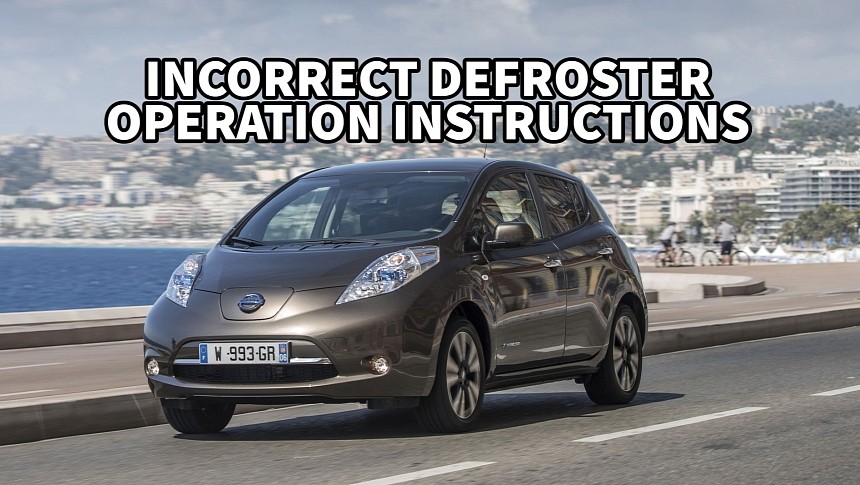I vividly remember my first lesson beginning in a parking lot, with the instructor telling me – in great detail – what every button does before I started to actually drive the car. The instructor also explained how to defog the windshield. Nissan has recently issued a recall for the Leaf over incorrect defogger/defroster operation information in the owner's manual, instructions that most peeps know from driving school.
The question is, why couldn't Nissan ignore said issue? As it happens, limited visibility due to reduced performance of the defogger/defroster goes against federal motor vehicle safety standard 103 section 4.3.
Nissan previously recalled the 2018 to 2023 Leaf over this problem under campaign 23V-048. The subsequent 23V-296 concerns 2013 to 2017 models produced for the US of A between November 2012 and July 2017.
The Japanese automaker started investigating the 2013 to 2017 Leaf back in February 2023. According to documents filed with the federal watchdog, there were no reports of accidents or injuries thus far. Owners will be presented with an addendum on how to operate the defogger/defroster under subject conditions. Owner notifications will be mailed beginning on May 26.
Known as Venucia e30 in China, the first-generation Leaf was produced between 2010 and 2017 for the 2011 through 2017 model years. Designed by Kazuki Yamazaki and Masahide Fujiwara, the all-electric hatchback originally sported a 24-kWh battery pack.
Gross capacity improved to 30 kWh for the 2016 model year. Launched in 2017 for the 2018 model year, the second-generation Leaf improved to 40 and 62 kWh, respectively. More conservative than its predecessor in terms of exterior styling, the current generation may not receive a successor due to rising demand for CUVs.
Nissan already has a compact-sized crossover in the Ariya, which is a rather bland name compared to Leaf. Speaking of which, the all-new Ariya was recalled only recently over – get this – detaching steering wheels.
Twinned with the Renault Megane E-Tech Electric, the Japanese crossover is tremendously costlier than the Leaf. More specifically, it's $43,190 as opposed to $28,040, sans destination charge and federal tax credit for going electric. The newcomer's most important specs are 304 miles (489 kilometers) of range from an 87-kWh battery, as little as 4.8 seconds to 60 miles per hour (97 kilometers per hour), and up to 389 horsepower.
As for the Leaf, make that 149 miles (240 kilometers) for the 40-kWh pack and 212 miles (341 kilometers) for the 60-kWh pack. Power and zero-to-60 acceleration don't really matter considering how old of a design the Leaf is, but still, it's more than adequate for prospective customers who drive mostly in the urban jungle.
The Leaf isn't the most affordable all-electric vehicle stateside at press time. General Motors can do better with the subcompact-sized Bolt EV and Bolt EUV, which are currently listed at $26,500 and $27,800 before taxes. Both of them will be discontinued by 2024.
Nissan previously recalled the 2018 to 2023 Leaf over this problem under campaign 23V-048. The subsequent 23V-296 concerns 2013 to 2017 models produced for the US of A between November 2012 and July 2017.
The Japanese automaker started investigating the 2013 to 2017 Leaf back in February 2023. According to documents filed with the federal watchdog, there were no reports of accidents or injuries thus far. Owners will be presented with an addendum on how to operate the defogger/defroster under subject conditions. Owner notifications will be mailed beginning on May 26.
Known as Venucia e30 in China, the first-generation Leaf was produced between 2010 and 2017 for the 2011 through 2017 model years. Designed by Kazuki Yamazaki and Masahide Fujiwara, the all-electric hatchback originally sported a 24-kWh battery pack.
Gross capacity improved to 30 kWh for the 2016 model year. Launched in 2017 for the 2018 model year, the second-generation Leaf improved to 40 and 62 kWh, respectively. More conservative than its predecessor in terms of exterior styling, the current generation may not receive a successor due to rising demand for CUVs.
Nissan already has a compact-sized crossover in the Ariya, which is a rather bland name compared to Leaf. Speaking of which, the all-new Ariya was recalled only recently over – get this – detaching steering wheels.
Twinned with the Renault Megane E-Tech Electric, the Japanese crossover is tremendously costlier than the Leaf. More specifically, it's $43,190 as opposed to $28,040, sans destination charge and federal tax credit for going electric. The newcomer's most important specs are 304 miles (489 kilometers) of range from an 87-kWh battery, as little as 4.8 seconds to 60 miles per hour (97 kilometers per hour), and up to 389 horsepower.
As for the Leaf, make that 149 miles (240 kilometers) for the 40-kWh pack and 212 miles (341 kilometers) for the 60-kWh pack. Power and zero-to-60 acceleration don't really matter considering how old of a design the Leaf is, but still, it's more than adequate for prospective customers who drive mostly in the urban jungle.
The Leaf isn't the most affordable all-electric vehicle stateside at press time. General Motors can do better with the subcompact-sized Bolt EV and Bolt EUV, which are currently listed at $26,500 and $27,800 before taxes. Both of them will be discontinued by 2024.










